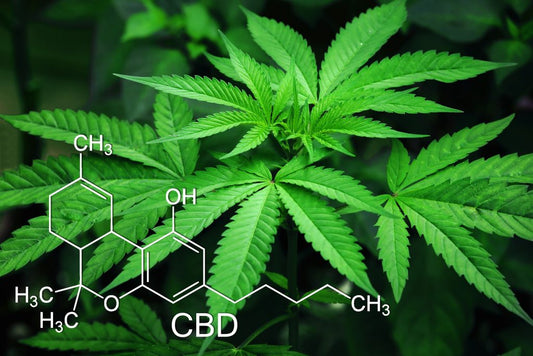Written by: Jacob Matthews
Reviewed by: Dr. Matthew Scott. PhD & DHSc
Date: 12/07/2022
CBD has become a household name in plant medicine and natural remedies. However, another lesser-known cannabinoid, CBG (cannabigerol), is growing in popularity for its potential wellness-driven benefits. If you're interested in exploring cannabinoids beyond CBD and finding ways to incorporate them into your wellness routine, you've come to the right place.
In this blog, we'll break down everything you need to know about CBG, the differences between CBD and CBG, how they work together, and some ways CBG may be helpful in your cannabinoid journey.
WHAT IS CBG?
CBG (cannabigerol) is one of the many naturally occurring cannabinoids in the cannabis plant, which interact with the body's endocannabinoid system (ECS). ¹ This non-intoxicating cannabinoid is often referred to as the mother cannabinoid since it acts as a precursor to many natural cannabinoids, including THC, CBD, and a few others. CBG is like a building block that transforms into other cannabinoids under certain environmental factors, like UV light, oxygen exposure, and temperature. ²
However, it's usually found in small quantities in mature plants. When hemp plants mature, the CBG has already gone through enough environmental exposure to be converted via enzymes into other cannabinoids. By harvest, only around 1-2% of natural CBG is usually left.
Plants high in CBG are usually harvested pretty early, so you won't find CBG in smokable hemp flowers. But that said, mature hemp plants rich in CBD are often extracted, leaving behind a concentration of CBG alongside major cannabinoids like CBD in a full-spectrum oil.
HOW DOES CBG WORK WITHIN THE BODY?
CBG, like other cannabinoids, interacts with the body's endocannabinoid system (ECS). The ECS is a complex network of molecules and receptors that work together to maintain balance and optimize bodily functions. Evidence suggests it may affect many processes, including body temperature, mood, sleep patterns, appetite, inflammatory responses, immune system function, and more.
Within the ECS are molecules called endocannabinoids, which are produced naturally by our bodies. These endocannabinoids act as chemical messengers, signaling different processes to help maintain equilibrium. CBG, along with other cannabinoids found in cannabis and hemp, might mimic the actions of these endocannabinoids, assisting in keeping the body balanced, as CBD does.
THE POTENTIAL BENEFITS OF CBG
While the research on CBG itself is scarce compared to major cannabinoids like THC and CBD, some studies have been conducted to explore some of the potential benefits of CBG for your overall wellness. CBG won't cause you to feel high, but since it might balance the ECS, it may help support several parts of your body.
NEUROPROTECTIVE PROPERTIES:
Research suggests that CBG may have neuroprotective effects, potentially offering therapeutic benefits for conditions such as Huntington's disease, Parkinson's disease, and Alzheimer's. A study published in Frontiers in Pharmacology demonstrated CBG's potential ability to protect neurons in mouse models of Huntington's disease. ³ That's not to say that CBG treated any symptoms of the Huntington's Disease model, though. Instead, evidence suggests that cannabinoids may delay the progression of the disease by protecting neurons from death.
It's essential to remember that animals and people are very different. Further study is still needed to determine if there's a link between CBG and neurons, so you should never use CBG (or any other cannabinoid, for that matter) to treat any medical condition. Always follow your doctor's advice for managing medical conditions.
PAIN AND INFLAMMATION:
CBG has shown potential as a potent anti-inflammatory agent. Inflammation is associated with various chronic conditions, including arthritis, inflammatory bowel disease (IBD), and neurodegenerative disorders. One study published in the journal Biochemical Pharmacology found that CBG might reduce inflammation and the production of nitric oxide in mice with experimental IBD. ⁴
Some evidence also suggests that CBG may offer pain-relieving properties, making it potentially helpful against pain caused by inflammatory conditions. A survey found that patients taking
CBG found that their pain levels improved while taking CBG. ⁵ However, it's essential to remember that these findings are anecdotal. No control group was surveyed, and researchers suggest further study to explore the effects of CBG on pain and anxiety.
Another study published in the Molecules journal found that CBG derivatives may help reduce pain and inflammation in mice. ⁶ The study also tested mice fed a high-fat diet and found that CBG may have improved their metabolism, suggesting that CBG may one day be helpful against obesity with further study.
MOOD AND SLEEP SUPPORT:
CBG's interactions with the endocannabinoid system mean that it may play a role in regulating your mood. The same patient survey we mentioned earlier found that CBG may have reduced feelings of depression, chronic pain, anxiety, and sleeplessness. Lack of sleep can be caused by stress and pain, among other things. ⁷ All of which can impact many areas of physical and mental health, causing further sleep-related issues, depression, or anxiety. But with the potential balancing effects of CBG on the ECS and this anecdotal evidence, you may find it easier to keep your mood leveled out and catch up on rest with CBG.
Research suggests that CBG binds to both CB1 and CB2 receptors within the ECS, potentially enhancing the function of anandamide, often referred to as the "bliss molecule" ⁸ By helping to maintain optimal levels of anandamide, CBG may contribute to motivation, pleasure, appetite, sleep, and pain management.
CBD AND CBG: BETTER TOGETHER:
While a fair amount of promising evidence supports CBG's potential therapeutic benefits, research is still limited and mainly involves animal models. More importantly, existing research is often conducted using full-spectrum cannabis oils that contain other cannabinoids and terpenes. That being said, it's hard to pinpoint precisely how much credit CBG deserves and how much potential effects might be caused by the relationship cannabinoids share.
Some research suggests that the cannabinoid found in full-spectrum oils may work together synergistically, potentially amplifying each other's effects. This phenomenon is commonly referred to as the entourage effect. The entourage effect refers to the idea that cannabinoids, terpenes, and other compounds in the cannabis plant work together, enhancing their individual therapeutic properties. ⁹
CBD has been researched extensively. Some evidence suggests that it might share many potential benefits of CBG, like inflammation relief and mood-balancing effects. ¹⁰⁻¹¹ It works closely with the ECS to bring balance, much like emerging research suggests CBG does.
Taking CBG and CBD together may enhance these potential wellness benefits and offer a broader range of effects than using either cannabinoid alone. Full-spectrum CBD oils, which contain a range of cannabinoids, including CBG, may help you to harness the entourage effect and benefit from the known properties of CBD while exploring the potential advantages that CBG may offer.
INCORPORATING CBG INTO YOUR WELLNESS ROUTINE
If you're interested in exploring whether or not CBG fits into your wellness routine, there are a few ways to get started.
First, try something simple like our Full-Spectrum CBD + CBG tincture. This tincture is specially formulated to be as close to natural levels of CBG as possible. As full-spectrum oil, it contains a comprehensive blend of CBD, CBG, and other beneficial cannabinoids and terpenes in our organic hemp plants. By choosing a full-spectrum product, you can maximize the entourage effect, where the different compounds work together synergistically to potentially enhance their individual effects.
Alternatively, you can explore Cannabigerol isolate, the purest form of CBG available, which allows for precise dosing and customization, making it an excellent option for those who prefer to tailor their cannabinoid intake. While isolates alone can't support the entourage effect, our CBG isolate is great for adding to existing CBD products or working into recipes and homemade topicals. By blending CBG isolate with your favorite CBD oil, you can create a personalized blend that combines the benefits of both cannabinoids while giving yourself more control over how much you include in your wellness routine.
It's crucial to start with a low dosage and gradually increase. Whether you opt for full-spectrum CBD oil or CBG isolate, it helps to follow packaging instructions. Always use a journal to monitor your serving size and document how each compound affects you.
While cannabinoids like CBG and CBD show promising research for therapeutic effects, nothing is set in stone yet. You should always talk to a doctor before taking them to ensure they're safe and won't interact with any of your medications. Remember that cannabinoids can't treat any medical condition, so it's important to always follow your doctor's advice for your health and wellness.
FINAL THOUGHTS
In conclusion, incorporating CBG into your CBD journey offers an exciting opportunity to explore the potential benefits of this lesser-known cannabinoid. While CBD has gained widespread recognition for its therapeutic properties, research on CBG is still evolving. However, early studies suggest that CBG and CBD may work together synergistically, potentially amplifying each other's effects through the entourage effect.




